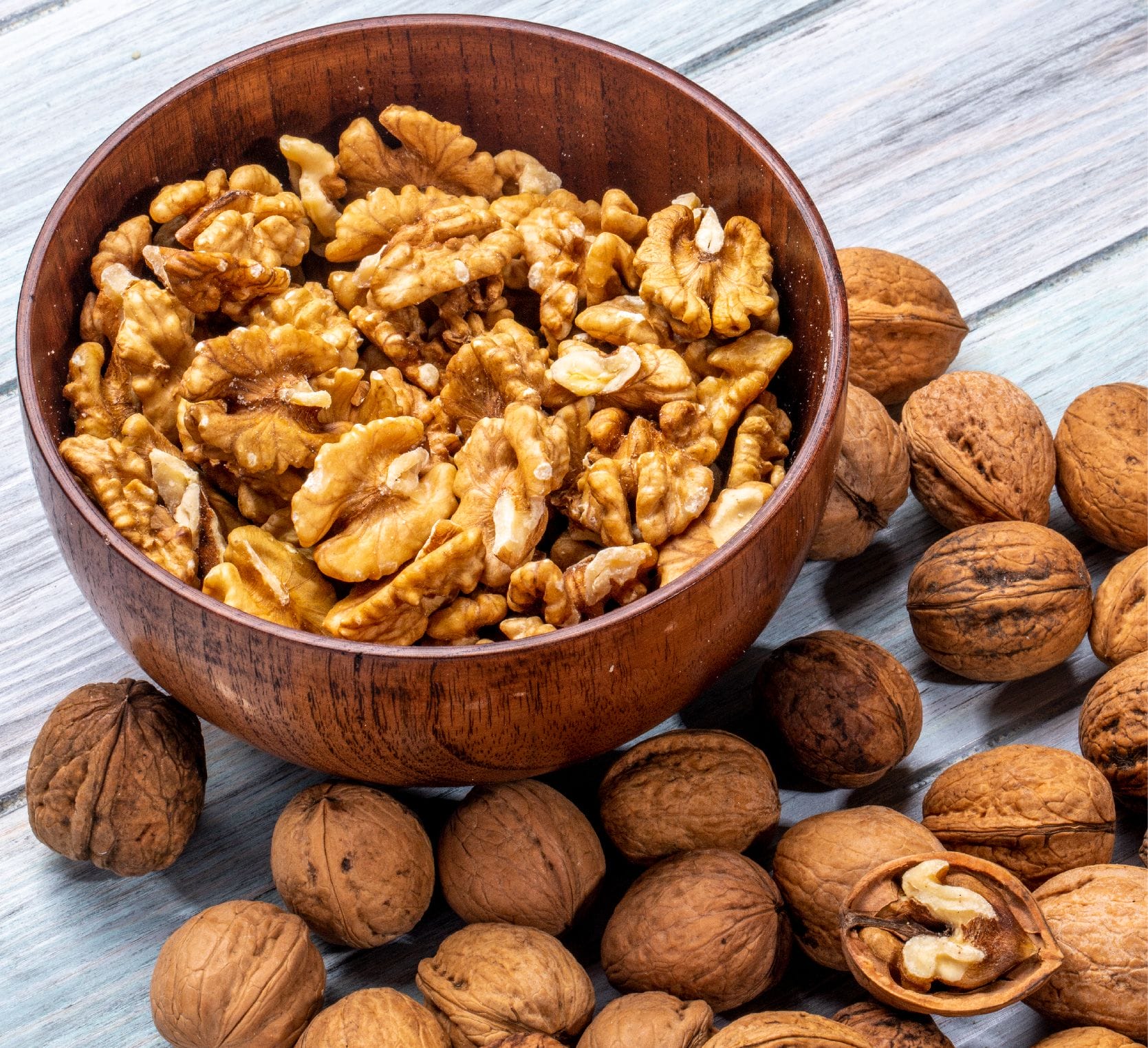This article is reviewed by an expert

Walnuts are one of the healthiest nuts available, packed with essential nutrients that provide numerous health benefits. From reducing the risk of heart disease to improving brain function, the benefits of walnuts are many. In this article, we’ll explore 15 surprising walnut benefits that you need to know about.
Nutritional Facts about Walnuts
Walnuts have a sweet taste, known as madhura or sweet rasa, and when consumed, they possess a heavy or guru quality, as well as a slimy or snigha quality. After digestion, the sweetness of walnuts remains. Additionally, walnuts have a hot potency, known as ushnaveerya, which can aid in igniting the digestive fire or Agni. By reducing Vata in the tri-Dosha, walnuts can also promote balance in the body. [8]
Walnuts are packed with essential nutrients that are beneficial for overall health.[9] A 1-ounce serving (28 grams) of walnuts contains:
Calories: 185
Protein: 4.3 grams
Fat: 18.5 grams
Carbs: 3.9 grams
Fibre: 1.9 grams
Vitamin E: 1% of the RDI(recommended dietary intake)
Magnesium: 11% of the RDI
Phosphorus: 8% of the RDI
Copper: 10% of the RDI
Benefits of Eating Walnuts
1. Rich Source of Antioxidants
Primary Benefits: Walnuts contain several types of antioxidants, including polyphenols, melatonin, and vitamin E. [2] [6]
Secondary Benefits: Walnuts are an excellent source of antioxidants, which protect the body from damage caused by free radicals. Free radicals are unstable molecules that can damage cells and contribute to the development of diseases like cancer and heart disease. [2] [6]
2. Promotes Heart Health

Primary Benefits: Walnuts are known for their heart-healthy properties. They are rich in monounsaturated and polyunsaturated fats, which are good for the heart. [1] [2] [5]
Secondary Benefits: Eating walnuts regularly can help reduce the risk of heart disease by improving cholesterol levels, reducing inflammation, and lowering blood pressure. [1] [2] [5]
3. Lowers Cholesterol Levels
Primary Benefit: Studies have shown that eating walnuts can help reduce LDL cholesterol levels, thus reducing the risk of heart disease. [1] [5]
Secondary Benefit: High levels of LDL (bad) cholesterol can increase the risk of heart disease. Weak digestive fire, also known as Agni, can lead to the accumulation of toxins in the body and an increase in bad cholesterol levels, also known as LDL cholesterol. Consuming walnuts can help to boost digestive fire and eliminate toxins, which in turn can increase the levels of good cholesterol, also known as HDL cholesterol, and help manage cholesterol problems. [1] [5]
4. Reduces the Risk of Diabetes
Primary Benefit: Diabetes, also known as Madhumeha, can occur due to an imbalance in the Vata Dosha, leading to impaired digestion and the accumulation of toxins, or Ama, in the body. However, consuming walnuts can help balance the Vata Dosha by reducing it and aiding in the removal of toxins.
Secondary Benefit: This can aid in the management of both type 1 and type 2 diabetes. Eating walnuts regularly can help reduce the risk of diabetes by improving insulin sensitivity and reducing inflammation. [1] [2]
5. Helps with Weight Management

Primary benefits: Walnuts are rich in fibre, protein, and healthy fats.[2] [4]
Secondary Benefits: These nutrients can help you feel full and satisfied for longer periods, thus reducing the chances of overeating and helping you reduce weight. [2] [4]
6. Improved blood sugar control
Studies have suggested that eating walnuts may help improve blood sugar control in people with diabetes. [2]
7. Boosts Brain Function

Primary Benefits:Walnuts are rich in omega-3 fatty acids, which are essential for brain health.[3]
Secondary Benefits: Regular consumption of walnuts can improve brain function, including memory, concentration, and cognitive abilities. [3] In ayurveda to treat hysteria, the seeds of walnuts are crushed and mixed with the juice of “nirgundi” (Vitex negundo) and administered as nasal drops. [7]
8. Improves Mood and Reduces Stress
Primary Benefits: Walnuts also contain polyunsaturated fats, which have been linked to reducing symptoms of depression and anxiety. [1] [6]
Secondary Benefits: Additionally, the magnesium in walnuts can help lower cortisol levels, a hormone that is released during periods of stress. [1] [6]
9. Improved immune function
Primary Benefits: Walnuts contain vitamin E, antioxidants, and other nutrients. [2]
Secondary Benefits: These nutrients can help boost the immune system and improve overall health. [2]
10 Enhances Bone Health
Primary Benefits: Walnuts are a great source of minerals like magnesium, phosphorus, and calcium, which are essential for maintaining strong bones.[2]
Secondary Benefits: Regular consumption of walnuts can help reduce the risk of bone-related diseases like osteoporosis. [2]
11. Anti-ageing properties
The antioxidants in walnuts can help protect the body from cellular damage and slow the ageing process. [6]
12. Anti-inflammatory Properties
Primary Benefits: Soaked Walnuts have anti-inflammatory properties that help reduce inflammation in the body.
Secondary Benefits: Chronic inflammation has been linked to several chronic diseases, including heart disease, cancer, and diabetes.[2]
13. Promotes Better Sleep
Primary Benefits: Walnuts contain melatonin, a hormone that regulates sleep-wake cycles. [8]
Secondary Benefits: Eating walnuts or massaging walnut oil on the scalp can help improve sleep quality and promote better sleep. [8]
14. Supports Gut Health
Primary Benefits: Walnuts are rich in fibre, which is essential for maintaining good gut health. [1] [2]
Secondary Benefits: Eating walnuts regularly can help improve digestion and reduce the risk of digestive problems like constipation and diarrhoea. [1] [2] An imbalance in the Vata Dosha can lead to diarrhoea due to the accumulation of toxins, also known as Ama, in the body. However, consuming walnuts can aid in the elimination of toxins, promoting a balance in the Vata Dosha and aiding in the treatment of diarrhoea.
15. Skin and Hair Benefits
Primary Benefits: Walnuts are rich in vitamin E and omega-3 fatty acids, which are essential for maintaining healthy skin and hair. [2]
Secondary Benefits: Vitamin E helps protect the skin from damage caused by UV rays and other environmental factors while the omega-3 fatty acids in walnuts can help improve hair health and reduce hair loss. [2]
FAQs
1. How many Walnuts should I eat in a day?
If you have good digestion or are able to digest food easily, you can consume 4-5 walnuts daily.
2. Do Walnuts help deal with high blood pressure?
Yes, walnuts may help in managing high blood pressure. This is because they help to manage cholesterol levels that can cause the narrowing of arteries, due to their “Ushna”(hot) property. This property also aids in digestion by helping to digest the “Ama”(toxin build-up). Additionally, walnuts have a “Hrdya”(heart tonic) property, which acts as a heart tonic and supports the functioning of the heart, thereby reducing the symptoms of high blood pressure.
3. Are Walnuts good for hair?
Applying walnut oil to the scalp can help control hair fall and promote hair growth. This is because hair fall is often caused by an imbalanced Vata dosha in the body, which walnut oil can help to balance. Additionally, walnut oil’s Snigdha(oily) and ropan(healing) properties can also help promote hair growth and reduce excessive dryness in the scalp.
4. Do Walnuts Cause Weight gain?
If you are struggling with weight issues and already consuming enough calories in your diet, it is advisable to avoid walnuts. This is because walnuts have madhur(sweet) and guru(heavy) properties that can contribute to weight gain.
5. Should walnuts be soaked before eating?
To make walnuts easier to digest, it is recommended to soak them before consumption. Soaking helps to reduce the heavy property of walnuts, making them easier on the digestive system. Soak the Walnuts by leaving them in a bowl of water overnight. The next day, remove the peels before eating.
Conclusion
In conclusion, walnuts are a healthy and nutritious food that offers numerous health benefits. From promoting heart health to improving brain function, the benefits of walnuts are many. Incorporating walnuts into your diet is an easy and delicious way to improve your overall health and well-being.
Disclaimer: This article is from a Health/ wellness & Ayurveda perspective only.
Reference:
- A Review Study on Phytochemistry and Pharmacology Applications of Juglans Regia Plant
- A Scientific Update on Juglans RegiaLinn.
- A Cross Sectional Study of the Association between Walnut Consumption and Cognitive Function among Adult US Populations Represented in NHANES.
- A Monounsaturated Fatty Acid-Rich Pecan-Enriched Diet Favorably Alters the Serum Lipid Profile of Healthy Men and Women
- Walnut-enriched diet increases the association of LDL from hypercholesterolemic men with human HepG2 cells
- The phytochemical composition and antioxidant actions of tree nuts
- Ayurvedic Plants in Brain Disorders: The Herbal Hope
- Akshotaka Herb Used In Ancient Indian Medicine- Literary And Pharmacological Review
- The nutritional value of walnut
























